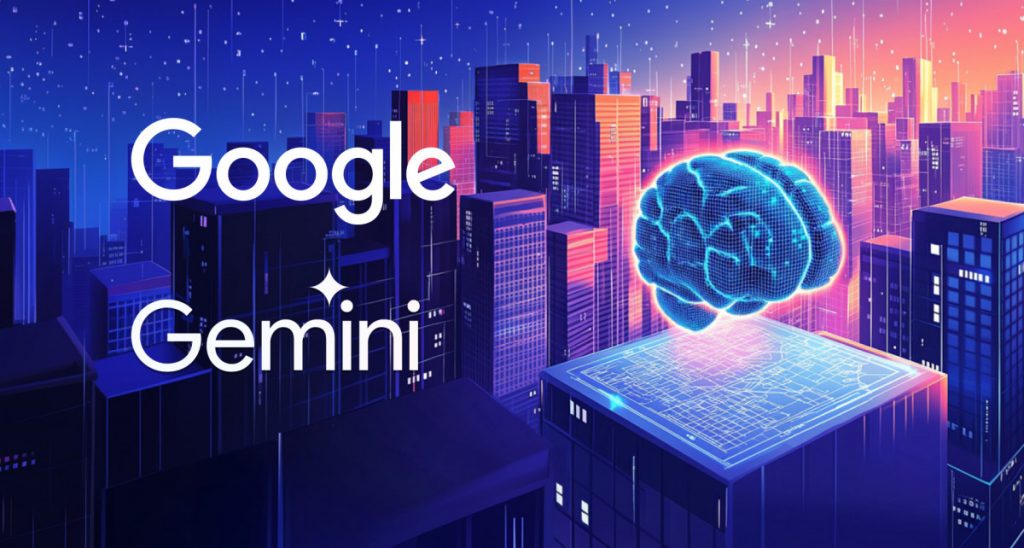Google Integrates AI Into Maps, Enhancing It With Hands-Free Guidance, Real-Time Traffic Reporting, And Local Insights


In Brief
Google integrated its Gemini AI into Maps, enabling conversational navigation, multi-step questions, and directions based on visible buildings instead of just distances.

Technology company Google introduced its Gemini AI into Maps, allowing users to navigate through conversational prompts, ask multi-step questions, and receive directions that consider visible landmarks rather than relying solely on distance measurements.
Google is integrating Gemini AI into Maps to enhance hands-free driving, allowing users to navigate, find stops along a route, check EV charger availability, and share ETAs simply by asking.
Navigating With Real-World Landmarks And Staying Ahead Of Traffic
Gemini can handle multi-step requests, such as locating budget-friendly restaurants with specific options, checking parking, and adding calendar events automatically when permitted. Users can also ask for popular dishes, recent news, or game updates without touching their devices.
Gemini improves navigation by using visible landmarks—like restaurants, gas stations, and well-known buildings—instead of relying only on distances, providing clear spoken directions and map highlights.
It analyzes Google Maps’ extensive database of over 250 million places combined with Street View imagery to ensure accuracy. Landmark-based guidance is now available on Android and iOS in the US.
The AI assistant also supports real-time traffic reporting; drivers can report accidents, slowdowns, or hazards verbally. Proactive alerts for unexpected road closures or heavy traffic are rolling out on Android in the US.
Furthermore, after arriving at a destination, Gemini helps users explore nearby places. By using the camera feature, users can identify restaurants, cafes, shops, or landmarks and ask questions about them, such as menu highlights or ambiance.
This Lens functionality, powered by Gemini, begins gradual rollout on Android and iOS in the US later this month, offering quick, conversational insights about locations around you.
From Search To Browser: Google Leverages AI To Make Tools Smarter
Google is actively integrating AI across its core services. Earlier this year the company introduced AI Mode for its search engine, enabling users to interact conversationally with results instead of relying solely on traditional links. This feature uses the Gemini 2.0 model and is designed to answer complex queries with reasoning and citations.
Furthermore, in Search, Google has added multimodal support in AI Mode: users can upload PDFs, images, or videos and ask questions about them. A new “Canvas” workspace facilitates planning and organising within the search experience.
Recently, the company has embedded AI into its browser, Chrome, with features like “Ask Google about this page” and an AI‑powered omnibox, thereby turning the browser into a context‑aware assistant rather than just a navigation tool.
By leveraging large‑scale language and vision models alongside real‑time data, Google aims to make its everyday tools more intuitive, context‑aware, and helpful for users and businesses.
Disclaimer
In line with the Trust Project guidelines, please note that the information provided on this page is not intended to be and should not be interpreted as legal, tax, investment, financial, or any other form of advice. It is important to only invest what you can afford to lose and to seek independent financial advice if you have any doubts. For further information, we suggest referring to the terms and conditions as well as the help and support pages provided by the issuer or advertiser. MetaversePost is committed to accurate, unbiased reporting, but market conditions are subject to change without notice.
About The Author
Alisa, a dedicated journalist at the MPost, specializes in cryptocurrency, zero-knowledge proofs, investments, and the expansive realm of Web3. With a keen eye for emerging trends and technologies, she delivers comprehensive coverage to inform and engage readers in the ever-evolving landscape of digital finance.
More articles

Alisa, a dedicated journalist at the MPost, specializes in cryptocurrency, zero-knowledge proofs, investments, and the expansive realm of Web3. With a keen eye for emerging trends and technologies, she delivers comprehensive coverage to inform and engage readers in the ever-evolving landscape of digital finance.



















































